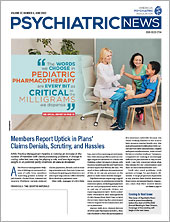The public discourse over the legal status of marijuana has largely centered on traditional cannabis products, including whole plant material and its major purified cannabinoids, delta-9-tetrahydrocannabinol (delta-9-THC) and cannabidiol (CBD). Many psychiatrists remain unaware, however, of the ways that nuanced legal distinctions between cannabis, marijuana, hemp, and these specific constituent molecules can profoundly impact the availability of these substances.
Delta-9-THC is the molecule classically credited with the plant’s psychoactive properties, while CBD is nonintoxicating but has been reported to have anxiolytic and possible antipsychotic effects. Delta-9-THC, however, is not the only form of intoxicating THC in cannabis plants. THC is best understood as a family of natural and synthetic isomers that have varying activity at the CB1 receptor and can thereby induce a variety of desirable (for example, euphoria, relaxation) and undesirable psychoactive effects (for example, addiction, psychosis). Cannabis strains differ not only in their delta-9-THC and CBD content, but also i1n the trace content of these other THC isomers that naturally can include small amounts of delta-8-THC and delta-10-THC. DSM-5-TR nomenclature reflects this reality by using the broad term “cannabis use disorder” rather than exclusively focusing on one component molecule.
Although Cannabis species have many uses beyond their controversial recreational and medicinal applications, their cultivation has long been limited within the United States by regulation of the Drug Enforcement Administration under the Controlled Substances Act. Congress therefore passed the Agriculture Improvement Act of 2018 (also known as “the 2018 Farm Bill”) in an effort to support the growth of America’s domestic hemp market.
This law led to a rapid proliferation of hemp and CBD products within the United States. These products, however, can be easily converted into delta-8-THC and a variety of other intoxicating compounds including the THC-O acetate derivatives, hexahydrocannabinol (HHC), tetrahydrocannabiphorol (THCP), and tetrahydrocannabivarin (THCV). Manufacturers have subsequently used this loophole to create a new market for psychoactive THC isomers that are sold as “legal hemp derivatives.”
These emerging psychoactive cannabinoids are now bypassing regulation around the country, and they have become especially popular in states that still have restrictive marijuana laws. Many are being marketed as “diet weed” or “marijuana light” in candylike packaging that gives an impression of safety, especially to adolescents. The few available clinical reports, however, show qualitatively similar effects to traditional delta-9-THC during short-term use. These molecules appear to primarily differ in their potency, with delta-8-THC being about two-thirds that of delta-9-THC, and delta-9-THC-O acetate being about twice as potent. Safety concerns are surfacing, but these discussions remain largely relegated to emergency medicine and public health circles with a focus on acute intoxication and contamination risks. The academic literature has thus far neglected the potential for long-term adverse impacts on mental health, which are especially salient for addiction and psychosis specialists.
Throughout the United States, delta-8-THC has now become the fastest growing segment of the cannabis market. An industry report by the Brightfield Group found that consumers interested in switching from CBD to delta-8-THC are more likely to use the drug daily and more likely to have a mental illness than the average CBD consumer. Further supporting these concerns, a survey posted November 19, 2021, in Cannabis and Cannabinoid Research found that many people are using delta-8-THC to self-treat mental illness without informing their medical providers. Notably, the authors found that 35.6% of respondents had substituted the drug for their antidepressant, and 23.3% had done the same for their prescribed antipsychotic.
Many communities are now struggling to regulate these products given the increasing power of the marijuana lobby. Without further research, policymakers and medical professionals will be left in an evidence vacuum. While we await more data, we can serve as advocates in our communities by educating politicians, parents, and patients on the known risks of traditional marijuana use, as well as the unknown and potential risks of novel THC isomers. ■
Editor’s note: In May, the Food and Drug Administration issued warning letters to five companies illegally selling products labeled as containing delta-8 THC in ways that violate the Federal Food, Drug, and Cosmetic Act selling CBD and delta-8 THC products.

